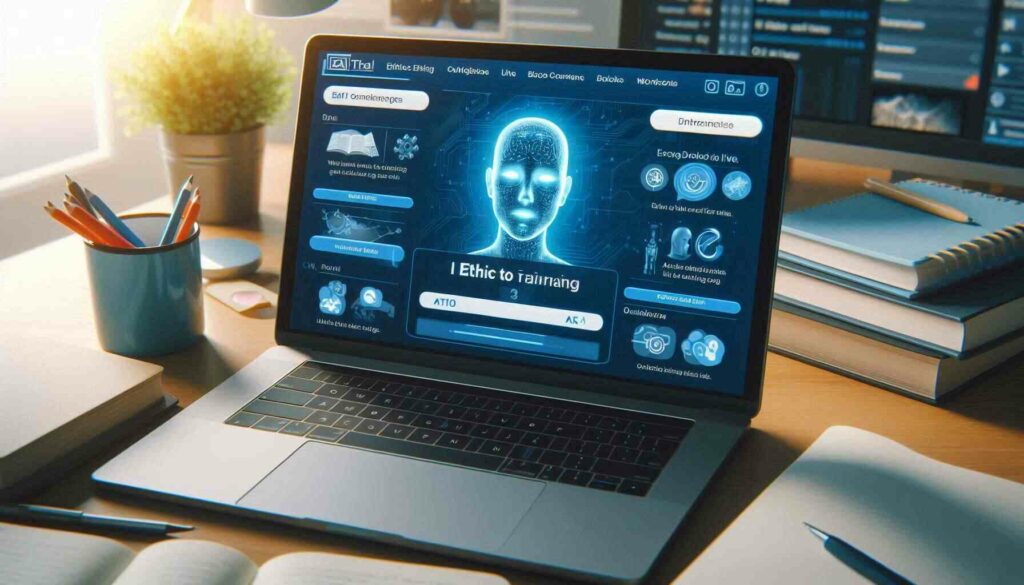
AI CERTS
5 months ago
AI Governance and Ethics Learning: A Critical Skill for the AI Era
As artificial intelligence (AI) becomes integral to everyday life, the need for AI governance and ethics learning has surged. Organizations across industries from healthcare to finance are implementing AI at unprecedented speeds. However, without ethical practices and strong governance frameworks, the consequences can be dire, including biased algorithms, privacy breaches, and lack of accountability. This article delves into the importance of AI governance and ethics learning, explores key frameworks, certifications, and real-world applications, and provides a roadmap for those looking to master these areas.

What is AI Governance and Why Does It Matter?
AI Governance and Ethics Learning refers to the policies, standards, and frameworks that ensure AI technologies are developed and deployed responsibly. As governments introduce AI-specific laws and businesses adopt AI to automate decision-making, the need for governance to address legal, social, and ethical challenges has grown.
Why AI Governance is Essential
- Avoiding Bias and Discrimination: AI models trained on biased datasets can unintentionally reinforce existing prejudices. Studies have shown that AI systems used in hiring or criminal justice can disproportionately affect marginalized communities, leading to systemic inequalities.
- Ensuring Transparency: Users and regulators need clear explanations of how AI systems make decisions. This transparency is vital for public trust, as many AI applications operate as “black boxes,” making it difficult to understand their decision-making processes.
- Regulatory Compliance: Organizations must align with laws like the European Union’s AI Act or the U.S. Algorithmic Accountability Act, which aim to enforce accountability in AI systems. Non-compliance can result in significant financial penalties and reputational damage.
- Building Public Trust: Transparent and well-governed AI fosters trust among consumers, regulators, and stakeholders. Public perception of AI can impact its adoption and success, making governance a critical component.
AI governance helps safeguard against risks such as biased hiring algorithms or financial models that unfairly deny credit. It’s essential for balancing innovation with accountability.
AI governance ensures responsible innovation by aligning AI development with ethical and legal standards.
Let’s now explore the crucial role that ethics plays in AI learning.
Ethics in AI: A Cornerstone of Responsible Development
AI ethics goes beyond compliance it’s about ensuring AI aligns with societal values. Ethical AI systems respect human rights, maintain fairness, and prevent harm. With increased reliance on automated systems in law enforcement, hiring, and healthcare, AI governance and ethics learning are more important than ever.
Core Principles of Ethical AI
- Fairness: Models should avoid discrimination based on race, gender, or other protected attributes. Fairness algorithms can help mitigate bias by adjusting the model’s decision-making process.
- Accountability: Developers must take responsibility for the actions of AI systems. Establishing accountability mechanisms, such as ethical review boards, can help ensure responsible AI deployment.
- Privacy: AI should safeguard user data and provide transparent consent processes. Techniques like differential privacy can be employed to protect individual data points while still allowing for meaningful analysis.
- Non-Maleficence: AI should minimize harm and promote well-being. This principle requires developers to consider the broader impact of their technologies on society.
Case Study: Bias in Hiring Algorithms
Amazon faced backlash when its hiring algorithm favored male candidates over female ones. The algorithm was trained on resumes submitted over a 10-year year, predominantly from men. As a result, it downgraded resumes that included the word “women’s,” demonstrating how bias can creep into AI systems. This incident underscored the importance of AI governance and ethics learning for preventing bias in automated systems.
Ethical AI practices ensure fairness and accountability, which are crucial for building trust.
Now, let’s explore the top certifications for mastering AI governance and ethics learning.
Top Certifications in AI Governance and Ethics Learning
Specialized certifications provide a pathway for professionals to deepen their expertise in governance and ethics. Below are leading programs that offer comprehensive learning opportunities.
1. AI Ethics Certification – AI CERTs
Learn more
This certification covers critical areas such as bias mitigation, data privacy, and corporate responsibility. Designed for business leaders and developers, it helps professionals align AI projects with ethical standards and avoid reputational risks. The curriculum includes case studies on ethical dilemmas faced by tech companies, equipping participants with practical solutions.
2. AI Governance Certification – AI CERTs
Explore here
This program focuses on governance frameworks, regulatory compliance, and risk management. Participants learn how to manage AI systems within legal frameworks and align with evolving government policies. The course includes interactive modules on implementing governance strategies and assessing AI risks.
3. Stanford Online Course on AI Governance and Ethics Learning
Learn more
This course dives into ethical frameworks and governance models, with practical insights through real-world case studies. The course emphasizes interdisciplinary approaches, drawing from law, philosophy, and computer science to address complex ethical issues in AI.
4. MIT's AI Policy and Governance Program
Explore here
This program offers in-depth learning on AI policy-making, legal compliance, and the governance of machine learning models. Participants engage with policymakers and industry leaders to understand the implications of AI technologies on society.
5. Coursera’s AI Ethics and Governance Program
Learn more
Coursera provides practical training on key governance topics like AI risk management, fairness, and ethical audits, with case studies from various industries. This program includes guest lectures from AI ethics experts and offers networking opportunities.
These certifications equip professionals with the essential knowledge to lead responsibly in the AI-driven era.
Next, let’s examine how global regulations are shaping AI governance.
How Global Regulations Influence AI Governance and Ethics
Regulatory bodies worldwide are recognizing the need to regulate AI technologies. From the European Union's AI Act to developments in the United States. Algorithmic Accountability Act, frameworks are emerging to govern AI’s impact on society.
Key AI Regulations to Know
- The European Union’s AI Act: This law categorizes AI applications by risk level, with stricter regulations for high-risk AI systems, such as those used in critical infrastructure, healthcare, and law enforcement. The Act emphasizes transparency, requiring organizations to disclose the use of AI systems and their capabilities.
- NIST AI Risk Management Framework (USA): A standard to manage risks associated with AI systems, promoting transparency and accountability. This framework guides organizations in assessing and mitigating risks throughout the AI lifecycle.
- China’s AI Regulation: Focuses on aligning AI with government priorities, including security and economic goals. China's regulations emphasize data security and algorithm transparency, requiring companies to ensure their AI systems comply with national interests.
Case Study: GDPR and AI
The General Data Protection Regulation (GDPR) in the EU sets strict rules on data processing and consent, impacting how AI systems handle personal data. Companies that violate these rules face heavy fines, demonstrating the importance of AI governance and ethics learning. The GDPR’s emphasis on user consent and the right to be forgotten has significant implications for AI applications that rely on large datasets for training.
Regulations are shaping the future of AI governance by enforcing accountability and transparency.
Let’s now look at some real-world applications where ethics and governance play a crucial role.
Real-World Applications of AI Governance and Ethics Learning
Governance and ethics frameworks are critical across industries, from financial services to healthcare. Here are some examples of how organizations apply these principles:
1. Healthcare
AI is revolutionizing diagnostics, but without proper governance, there’s a risk of biased outcomes. For instance, predictive models must account for diverse patient data to ensure fair treatment. Organizations like IBM Watson Health have implemented AI-driven solutions while prioritizing ethical considerations in data usage, emphasizing the importance of diverse training data.
2. Finance
Banks are using AI for credit scoring, but biased algorithms can deny loans unfairly. Ethical frameworks ensure these systems are transparent and equitable. The introduction of explainable AI (XAI) helps stakeholders understand the reasoning behind AI-driven financial decisions, promoting fairness and accountability.
3. Autonomous Vehicles
AI-powered self-driving cars raise ethical questions about accident liability. Governance frameworks are essential to address safety and accountability. For example, companies like Waymo and Tesla are actively working on ensuring that their AI systems prioritize human safety while navigating complex urban environments.
4. Marketing and Advertising
AI-driven advertising platforms use consumer data to optimize campaigns. However, ethical concerns arise when data privacy is not prioritized. Companies must implement governance structures that ensure transparency in data usage, allowing consumers to understand how their information is being utilized.
Case Study: Uber’s Autonomous Car Incident
In 2018, an Uber self-driving car fatally hit a pedestrian, highlighting the need for governance and ethics to address the responsibilities of autonomous systems. The incident sparked discussions on regulatory frameworks for autonomous vehicles, emphasizing the importance of accountability in AI deployment.
Real-world applications demonstrate the importance of responsible AI practices to protect users and maintain public trust.
Now, let’s explore the future trends shaping AI governance and ethics learning.
The Future of AI Governance and Ethics Learning
The future of AI governance will be shaped by technological advancements, evolving regulations, and societal expectations. Here are some trends to watch:
1. Increased Regulatory Scrutiny
As AI becomes more integrated into daily life, governments will likely impose stricter regulations. Companies must proactively engage in AI governance and ethics learning to ensure compliance and anticipate regulatory changes.
2. Adoption of Ethical AI Frameworks
Organizations will increasingly adopt ethical AI frameworks to guide development. This includes establishing ethical review boards and regular audits to ensure AI systems align with societal values.
3. Interdisciplinary Approaches
The convergence of various fields, such as law, computer science, and social sciences, will drive a more comprehensive understanding and governance of AI. Educational programs will evolve to incorporate interdisciplinary perspectives.
4. Rise of Explainable AI
As demand for transparency grows, the development of explainable AI will become critical. Organizations must implement models that allow stakeholders to understand AI decision-making processes clearly.
5. Greater Public Engagement
Public dialogue about AI governance will expand as communities demand more accountability and ethical considerations. Organizations must engage with the public to understand societal concerns and expectations regarding AI technologies.
The future of AI governance and ethics learning will be marked by regulatory changes and societal expectations.
Let’s summarize the key takeaways from our exploration of AI governance and ethics learning.

Key Takeaways
- AI Governance is Essential: Implementing governance frameworks ensures that AI technologies are developed and deployed responsibly.
- Ethics Drives Responsible AI: Ethical principles like fairness and accountability are critical for building trust in AI systems.
- Certifications Enhance Expertise: Specialized certifications provide professionals with the knowledge and skills needed to navigate the complexities of AI governance and ethics.
- Regulatory Landscape is Evolving: Understanding global regulations is crucial for organizations to ensure compliance and mitigate risks associated with AI deployment.
- Real-World Applications Highlight Importance: The practical application of governance and ethics in various industries illustrates their significance in protecting users and maintaining public trust.
Conclusion
AI governance and ethics learning is not just a trend but a necessity in the rapidly evolving landscape of AI technologies. As organizations adopt AI, understanding these principles will become essential for professionals across all sectors. Investing in education and training will prepare leaders to navigate the complexities of AI responsibly and ethically, ultimately fostering innovation that aligns with societal values.
"Have questions or need assistance? Reach out to us at AI CERTs, and let our expert team guide you on your journey to mastering AI and ethics!"
Here are our other articles you might be interested :